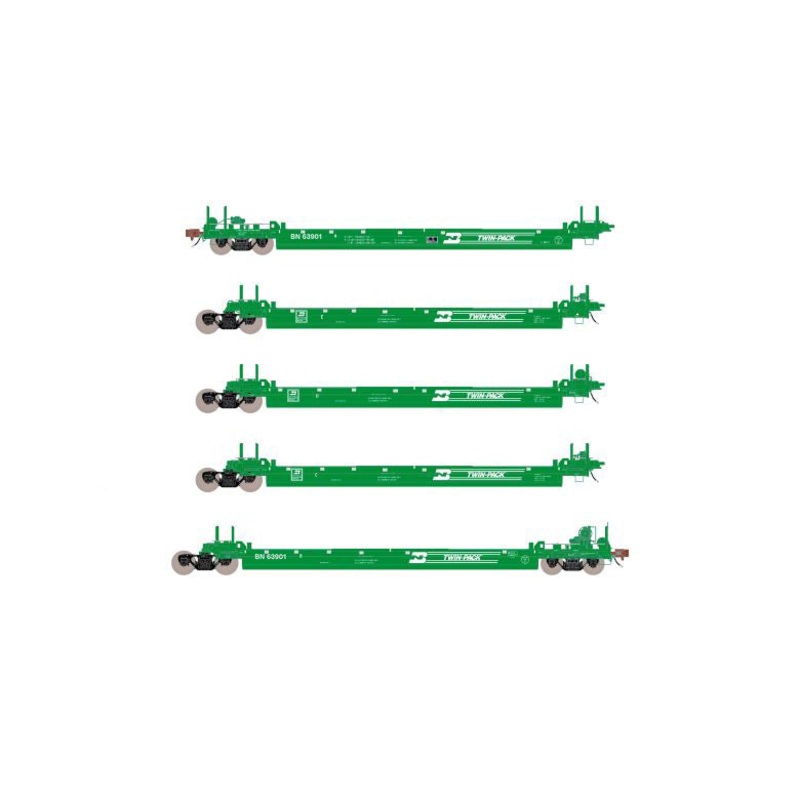

 Sale!
Sale! ScaleTrains 40090 HO Scale Rivet Counter PS-Trinity 5 Unit Backpacker Well Car BN 63909Introduced in 1986 by longtime builder Pullman-Standard, the Backpacker well car is a 5-unit, articulated car featuring 40 wells. All five wells can handle a 40, 45, or
Introduced in 1986 by longtime builder Pullman-Standard, the Backpacker well car is a 5-unit, articulated car featuring 40 wells. All five wells can handle a 40, 45, or 48 container loaded in the top position, with 53 containers staggered in every other well in the top position. The Backpacker is distinguished from other intermodal cars by its low-profile design. Many continue in service today.
The bodies are die-cast metal for optimum weight and performance. Like all Rivet Counter freight cars, the Backpacker features photo-etched stainless-steel see-through walkways, wire grab irons, die-cast metal knuckle couplers, trucks with rotating bearing caps, and much more.
FEATURES:
NOTE: Road number may vary from picture shown.
In the late 1970s, a transportation revolution took shape with the development of the double-stack well car, a collaborative effort between ACF Industries and the Southern Pacific Railroad. Recognizing the advantages of this innovation, numerous freight car builders swiftly joined the fray, catering to the burgeoning demand. Early designs, such as those pioneered by ACF for SP, as well as offerings from Thrall and Gunderson, featured bulkheads and position-able stops, called “flippers” to secure containers in the uppermost position. However, these features added extra weight and maintenance requirements.
By the mid-80s, with double-stack traffic on the rise, well-car designs underwent further evolution. In 1986, Pullman-Standard introduced the “Backpacker” well car, a product of Youngstown Steel Door’s design. This articulated 5-unit car, manufactured at Pullman-Standard’s Bessemer, AL facility, boasted 40 wells with a tapered, low-profile shape. Diverging from earlier designs, the Backpacker eliminated bulkheads, relying instead on Inter-Box Connectors (IBCs) akin to those used in securing containers on ships. This innovation reduced tare weight, ultimately enhancing fuel efficiency for railroads.
Initially, the Backpacker had limitations on container loading, with the middle three wells unable to handle pairs of 20 containers due to their weight. However, later production models addressed this issue with reinforced wells, allowing for the loading of pairs of 20 containers across all units. Furthermore, all five units could accommodate containers ranging from 40 to 48 in the top position, with staggered 53 containers possible in alternating wells.
The Backpacker design garnered significant attention, particularly from Trailer Train, leading to multiple orders in the latter half of the 1980s. Despite Pullman-Standard’s absorption by Trinity Industries, the design remained unchanged, albeit with Trinity logos alongside P-S branding. Burlington Northern notably acquired a fleet of Backpackers, painted in their distinctive Cascade Green, defying the trend of railroad reliance on Trailer Train equipment.
Most Backpackers arrived in Trailer Train yellow, adorned with “TT” logos and branding. Some featured additional logos for specific steamship lines or railroads, such as “K” Line, RailBridge Corporation, Maersk, or Southern Pacific Railroad. However, by the early 1990s, the practice of sub-lettering diminished, and Trailer Train transitioned to TTX Co., adopting a new black-and-white striped “speed” logo. Over time, TTX evolved its branding, eventually unveiling a stylized logo in Tuscan red in 2008.
Despite their relative obscurity among the broader fleet of well-cars owned by TTX, most Backpackers remain in service, proving valuable for international container traffic handling 20 and 40 containers. Their durability and utility continue to make them viable assets in contemporary freight transportation.
Standard Shipping
Cost: $25
Free Shipping
We offer free shipping on orders over $30. Please check the free - shipping eligibility at checkout.
Delivery Time:
It usually takes [3-5] business days for standard shipping. Please note that this is an estimated time frame and may be affected by local holidays, and unforeseen circumstances.
Reviews
There are no reviews yet.